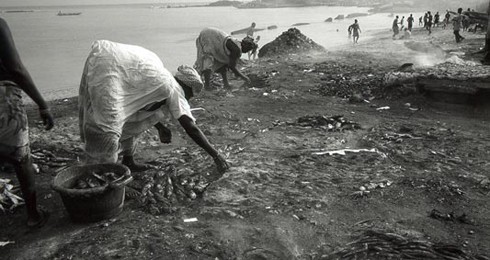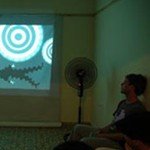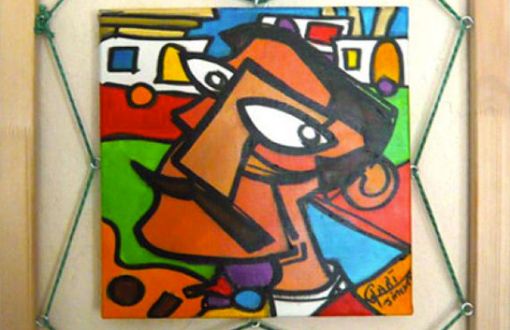
We have followed their journey, a tragic odyssey crossing the desert. We have come to know of new lagers in Europe and in the Maghreb countries, where Libya - sponsored by the European Union and through recent agreements reached with Italy - hold a sad record of torture and rapes.
They have spoken about their journey in the Mediterranean and we have seen with our own eyes bodies and rags of clothes brought to our shores. We have read about the tragic destiny these men and women are facing, when leaving their homeland Africa in long epic poems of the Italian writer Erri De Luca (1) and we have witnessed their loneliness in documentaries by Bruno Ulmer in Welcome Europa and Come un uomo sulla terra (Like A Man on Earth) by Riccardo Biandene, Andrea Segre and Dagmawi Yimer.
No matter how many stories we read about migration, very few witness suffering experienced by those who stay behind. Fathers, mothers, young husbands and wives, tormented friends faced with feelings of neglect and helplessness in the absence of their loved ones. Their suffering leaves no echo.
It is precisely these absent faces that inspired a photographer and a documentary filmmaker to embark on their most recent creations. "Tragedy", reads the website of the photographic exhibition "happens on Senegalese and Mauritian shores where thousands of young people, the majority fishermen, do not manage to make a living to sustain their family, hence are forced into exile. Small boats which were once synonymous to life and wealth, are now confronted by the wide ocean for a trip often without return which the Wolofs call mbëkk mi - which literally means: to knock against the ocean's waves...." (2)
It is precisely in Senegal that Sophie Bachelier works on a photographic shoot accompanied by filmed testimonies of women who relate how their sons' or husbands' emigration radically changed their life, sometimes driving them to insanity. The pictures and interviews of these women were taken at Thiaroye-sur-mer, at Saint Louis and at Rufisque (Jokkul Kaw quarter) in Senegal. The pictures were taken in black and white and depict tremendous sadness, sadness close to the human tragedy they live. Moreover, the photos depicting the landscape, or else this crown of fish with a sad connotation placed on the beach are traces of beauty and poetry that the cruelty of life can not erase, in fact on the contrary.
Fatou Lo, Fatou Diouf, Fatou Seck Ndoye, Binta Diallo, Diaba Diop, NDeye Marieme ... with just one look speak of the loss they suffer. They have fixed objectives in life and although faced with utter sadness, their attitude is good. They work most of their time, in their uniforms, worn elegantly every day. The pause taken to capture the picture is totally justified. "I wanted to stop for a minute and act as a mediator, I wanted those seeing these pictures or watching these films to come face to face with the reality these dignified women are living. I believe this is only right if we take into consideration the difficult life they lead."
Sophie Bachelier embraces this pause within herself too and her bright eyes light up this gentleness in her face. In the vivid calmness of her domicile in Paris, she is welcoming and ready to listen whilst giving a careful account of her work.
She tries to explain how these women try to refill the emptiness they endure by their sons' departure. "Usually it is sons who care for the parents. However, since their sons can not assume this role anymore, they work multiple jobs to provide for the needs of the children and the elderly."
They who process the small amount of fish which the ocean still produces, salt and smoke the meagre catch with their feet in the cinders, sweep the village roads, and make and sell fatayas (meat fritters). They are hard workers who apart from suffering the loss of their loved one, suffer from the weak economy in their village.
The sea has been ripped off its fish by vessels flying international flags, consequently leading to the progressive disappearance of local fishermen. "For the young generation that remains and tries to make a living from unsuccessful fishing, the metal waste disposed of in the Atlantic ocean is often more lucrative than fishing itself, since fish are nearly non-existent today." deplores Sophie Bachelier.
The ecological disaster is adding more misery to the above difficulties. In Jokkul, for example "land is shrinking in an alarming way. In fact the sea is relentlessly eating away the coast, thus putting fishermen's habitat in danger. The city is also growing and eating away new areas" explains the artist, who objects to the fact that the Senegalese government has neglected these coastal areas. "People are at their poorest, totally abandoned and entrenched in misery with the increasing number of devastating floods hitting these areas, killing more people than ever. This year, 2010, I have already lost four friends of mine, some of whom were very young. They were dead in very little time because of Malaria".
However the worst of news to this region is without doubt the emigration of young men, an increasing problem the Senegalese government has never tried to stop. "New Senegalese blood is spreading in the ocean, bleeding slowly like a hemorrhage" says the Senegalese director and scriptwriter Samba Félix Ndiaye with regards to the emigration reality he witnessed. He died almost a year ago at the age of 63. (3)
It is as if Sophie Bachelier listened to her friend's cry. In fact he had chosen to film a documentary "to show Senegal as it is today, Africa and its place as a continent in the world." This is why apart from taking photos; Sophie also filmed the exceptional life these women had to offer and yet the life of so many other women like them, mothers and wives of men who disappeared in the ocean, imprisoned for life in detention centers or wandering around as illegal immigrants in big European cities in desperate search of work and integration that Europe still refuses to supply them with. She started her project by gathering these women's different stories. The music played in the movie by composer Zad Moultaka and the picture, of such rare quality gives the film, still in the making a special poetic and striking touch.
Equally terrible whilst listening to these emigration narratives is the life of the abandoned women, whose men have left them behind. They find themselves drowned in their own tragedy, eternally waiting for their husband, condemned to a life they can never remake even though their loved ones would have died at sea. They can neither ritualize their mourning nor their separation. This is why when some women discover that their loved one has the intention of emigrating they ask for a divorce before he leaves to go on his journey, le "mbëkk mi".
"Nowadays emigrating is much different than in the past. Today, those who wish to leave have to acquire their family's consent to leave. Therefore some leave without their parents' or wife's permission, who refuse their departure most of the time", says the photographer. Despite their many unfortunate stories at sea, their closure in a detention centre (some spend years on end), their disappointment of Europe, their nightmare of being sent back, or worse being shipwrecked and disappearing at sea and rolled back on Senegalese shores - crossing the ocean still remains in the collective imagination of a whole generation of young men the only way out of their misery.
Sophie Bachelier has been living and working between France and Senegal for the past 15 years. Her livelihood depends on a diversity of jobs she embarks on. She learnt how to speak Wolof and produced three albums for the Senegalese singer El Hadj NDiaye (he won best prize by the Academy Charles Cros). She also edited a film on behalf of an Italian NGO called CISP (Le Comité International pour le Développement des Peuples) "Le piège" (The trap), a film by Djamel Benramdane and Kays Djilali which speaks about the difficulties faced by Sub-Saharan migrants who find themselves literally trapped in the Maghreb countries. Some portraits of Senegalese women, a project she is whole-heartedly working on will be published in October, a bilingual piece of work: "Lentement/Slow", inspired by texts written by Seneglaese writer Boubacar Boris Diop and the Sicilian intellectual Nando della Cheisa. (4)
However the biggest achievement Sophie Bachelier got from her work was the encounter itself with the women of Thiaroye-sur-mer, of Rufisque and Jokkul Kaw.
"I gave them photos I took of them. They loved their pictures. They recognised themselves in the pictures. This was the biggest gift I could have ever received", relates surprisingly, the photographer.
"Personally speaking, writing is not a job, it is company I cherish and ways to recollect void moments" Erri De Luca told Rober Bober (Arte) recently. "Recollecting void moments": it is decisively the same approach that is seen in the creations and in the path taken by Sophie Bachelier.(ÇT)
---
Notes:
1) Erri De Luca, Solo andata, Feltrinelli, 2005 - www.babelmed.net/1497fr
2) www.sophiebachelier.com
Sophie Bachelier: "lézarts de la bièvre". www.lezarts-bievre.com
3) www.aps.sn61720
4) Lentement / Slow, collection "D'ici là", Editions VMCF - www.dici-la.fr








